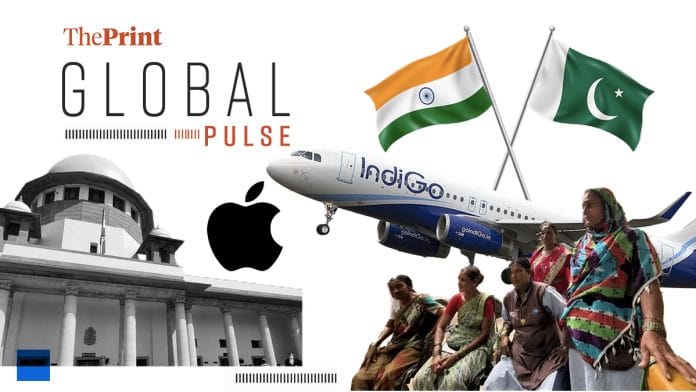New Delhi: According to the World Justice Project, on matters of speed, India’s judicial record is abysmal. It ranks at No. 131, right below Pakistan and Sudan, according to The Economist’s Essential India newsletter.
The magazine paints a picture of several levers out of place, which together form India’s “sclerotic justice system”.
“The judiciary is also overworked and understaffed. Nearly a third of judge positions and a quarter of support staff roles in high courts are vacant. But filling vacancies alone is not enough. Even at full strength, the caseload would never be cleared because of new cases constantly being filed. In 2024 the lower courts disposed of 23m cases, even as 25m were added. Our calculations suggest clearing the backlog would also require a 40% productivity increase, sustained over five years,” The Economist writes.
The New York Times takes readers into the nerve-wracking Delhi-Srinagar Indigo flight, where intense hail damaged the aircraft’s nose.
“The plane jolted upward and from side to side, and then plunged again, over a period of five to six minutes, Mr Samiullah recounted. He was sure the plane would crash into the mountains below or be struck by the lightning visible from the windows,” reports Jenny Gross in NYT.
Meanwhile, despite US President Donald Trump’s rather heavy-handed directives to Apple CEO Tim Cook, that the company “reshore its production facilities to the US”, Apple appears to be going ahead with their manufacturing plans in India, writes Veena Venugopal in The Financial Times.
“The tech company’s key contractor, Foxconn, is setting up a $1.5bn component plant near Chennai in Tamil Nadu to make display modules for iPhones,” according to the FT’s latest scoop.
Although Apple does manufacture outside China in places such as Vietnam and Malaysia, India has emerged as the biggest destination in its efforts to diversify its supply chain. Last month, the FT reported that all US-bound iPhones would eventually be made in India,” she writes.
In Pune, waste pickers have turned organised climate educators by way of Swach, PPPP—a pro poor private public partnership, reports The Guardian.
“We have argued that waste collection itself is green work but it’s not necessarily decent work. And there has to be a way to make it decent,” the founder of Swach tells the British daily. “The model helped transition the work of waste collectors from the informal sector, in which they spent their whole day at public bins and roadsides in tattered clothes, to a more formalised setup, where they began wearing a uniform and started speaking directly to residents.”
Also, in The Guardian, Hannah Ellis-Petersen reports how Pakistan has blamed India for the alleged suicide attack on a bus in Balochistan, which killed three schoolchildren.
“No militant group immediately claimed responsibility for the attack. However, the media wing of Pakistan’s military swiftly issued a statement alleging that its neighbour and rival India had ‘planned and orchestrated’ the attack,” she notes, adding that this comes amid a particularly ‘volatile’ time in India-Pakistan relations.
(Edited by Zinnia Ray Chaudhuri)
Also read: Global media reports on India’s ‘sprint to crush Maoist insurgency’ & the fall of Basavaraju






